April 2015 |
HR InTouchThe Monthly Newsletter of the Greater Madison Area SHRM |
||||||||||||||||||||||||||||||||||||||||||||
In This EditionPresident's Message Government Affairs Right-To Work: What it Means for Wisconsin Employers Wisconsin Non-Compete Legislation IntroducedThe Employer Should Have Acted Sooner Diversity Volunteer Opportunity - Salvation Army Job Connect Technology in HR Have You Found These 10 Hidden LinkedIn Features? Professional Development Certification Webpage now available! Professional Award Community Events Is Your Company a Great Place to Work? GMA SHRM Social Media Our Member Directory is Now Mobile Friendly! GMA SHRM Upcoming Events HR Toolbox - April 9
Topic: Fun as a Leadership Competency GMA SHRM Revealed - April 30th Human Capital Conference - May 12 Celebrating our 10th Annual Conference - A Decade of Difference. GMA SHRM Member News
|
A Decade of Difference!
Each year our Human Capital Conference raises the bar on the quality of its keynotes and breakout sessions and the opportunity to network with your peers is unparalleled. You won’t find a better value for your time and money than to spend a day of learning and networking. For only $125, you really can’t go wrong! And, stick around for the networking reception at the end of the conference and you just might win an iPad! Jeff Russell
Click here to view the full GMA SHRM Board of Directors
Right-To Work: What it Means for Wisconsin Employers
|
Forward HR
Want to know what’s going on in HR for the other areas of Wisconsin? WI SHRM has a new blog, Forward HR. Click here to take a look.
April 9, 2015 – HR Toolbox
Topic: Fun as a Leadership Competency
Location: City Center West
Is having fun at work a legitimate strategy for organizations? Certainly we hear about some famous companies who are not afraid to put humor and enjoyment upfront in their visions (like Southwest Airlines and Google.) This experiential session will help you to understand the value
of fun in relation to problem solving, creativity and innovation. You'll learn why fun can be a powerful motivator and some guidelines for leaders when utilizing fun, humor and play as a management strategy.
Colleen Miller will be our presenter for this event. After receiving a B.A. in psychology, Colleen went on to obtain a law degree and practiced personal injury and family law for 12 years. She is the founder of Lighten Up Consulting and is now working as an elite speaker, an intuitive life strategist, a transformational coach and enlightening author.
For more information, click here!
Return to Top
April 30th - GMA SHRM Revealed!
Thursday, April 30th 4:30pm-6:30pm
Location: Badger Bowl
Are you a new GMA SHRM member or are you a current member looking to get more involved? Come out and join us for GMA Revealed (previously known as our semi-annual member orientation)! Our newly restructured event is designed for all members of GMA SHRM. You will have an opportunity to meet each of our board members, learn about specific GMA SHRM committees and how your involvement can benefit your career. You don’t want to miss this opportunity to learn about the great programs, networking opportunities and events that GMA SHRM will offer your future.
Hors d’oeuvres and beverages will be provided. Although this is a free event, we would like you to register ahead of time so we can better prepare for the event size.
For more information, click here!
Return to Top
2015 Human Capital Conference - Save the Date - Registration Open Soon!

GMA SHRM Member Spotlight
 Name: Keri Braithwaite
Name: Keri BraithwaiteWhere do you currently work?
The QTI Group
What is the focus of your position?
As a Client Employment Specialist, I partner with our clients to address their direct hire, long term and short term staffing needs by providing top-notch, qualified candidates within a variety of industries and professions.
How long have you been in the Human Resource field?
10+ years
Which of your career accomplishments makes you proudest?
I am proud to work at The QTI Group! Every day is extremely rewarding as we see the results of our team’s efforts. I feel fortunate to be able to positively impact Madison area businesses, and enhance lives within our community with each successful placement.
I am equally proud to have participated in the Bike4BGC event this past year on QTI Group’s corporate team. The Bike4BCG event is an annual, fun-filled bike ride where pledges are raised to support the ongoing mission of the Boys and Girls Club of Dane County. I not only participated by riding in the event but also helped raised $1,000+ in pledges. I’m happy to share I was asked to join the Bike4BGC Committee for this year’s event. I am looking forward to playing an even greater role in the continued success of this fantastic organization.
What is the best advice you’ve ever received?
Tomorrow is never promised, so make today count.
Why did you decide to join GMA SHRM?
To stay connected with other human resource professionals, and stay abreast of the many changes within human resources.
GMA SHRM Volunteer Spotlight
 Name: Julie Pankow-Helland
Name: Julie Pankow-HellandHow long have you been volunteering with GMA SHRM?
8 years
What committee are you volunteering with? Have you volunteered on other committees? If yes, which one?
Communication and Marketing
What do you enjoy about volunteering?
I like being able to help with the marketing ideas. My background is in marketing and reaching out to others.
What would you say to others who are considering volunteering with GMA SHRM?
Please find one of the committee’s that would fit your interests. Or try a new one to learn how to help in a new area.
What have you gotten back from volunteering with GMA SHRM?
I have gotten a good feeling of being able to be part of the Communication and Marketing committee’s progress. I have also meet some really great people along the way.
Welcome New Members!
GMA SHRM welcomes the following members who joined our chapter in January 2015!
| Theresa L. Balsiger, PHR | The QTI Group |
| Michelle Bay | Adecco |
| Jill Dohnal | The QTI Group |
| Marci Dubler | Physicians Plus Insurance Corporation |
| Terri Galloway-Mautz | Extendicare Health Services Prostep Rehab |
| Connie Gower | Rainbow Group LLC |
| Sarah Imhoff | Express Employment Professionals |
| Abbe Klein | Hausmann-Johnson Insurance |
| Holly Kollwelter | Care Wisconsin |
| Jane Maule, SPHR | State of Wisconsin DHS |
| Katie McCloskey | Carlson Dettmann Consulting |
| Stephanie Meier | Momentum Insurance Plans |
| Melissa Nicolai | Family Service Madison |
| Nikole Pucci | MRA - The Management Association |
| Brian Schmeiser, SPHR | Curcio Webb, LLC |
| Kathryn Smith | American Family Insurance |
| Jacqueline St. Onge | The Fiore Companies |
| Valerie L. Steiner | County of Lafayette |
| Kristen Whitsen | Foley and Lardner, LLP |
| Stacy Wolfe | Cellular Dynamics International |
Movin' Up
In Transition
If you are a member who is in between jobs, or who is currently employed but seeking new positions or career paths, write us a brief description of your skill set, areas of expertise, what you’re looking for, etc. Send us an e-mail. We’ll publish your information in the next HR InTouch.
HR InTouch Guidelines
Article Writing:
Do you have an interest in writing for the HR InTouch? We have an interest in learning more about your area of expertise!
Why should you volunteer? Top three reasons: 1) to share your knowledge and experiences to educate others; 2) to become more connected in the HR and Dane County communities; and 3) to contribute towards the advancement of GMA SHRM and the HR profession.
The first step is for you to choose a submission option: you can pre-submit an article to GMA SHRM at any time for us to use in any of the upcoming newsletters, you can sign up to write for a particular month, or we can put you on a list of people to contact in future months whenever we need articles.
Article length:
Because the HR InTouch is now in an online format, the size is flexible. The article should be engaging and hold readers’ attention. Include the core information in your article, and we will advise if it is too lengthy.
Solicitation:
GMA SHRM is conscious not to allow solicitation through the articles, in an effort to protect the interests of our partners and members. The nature of the article should be educational (i.e., what are the business advantages of having a product like yours) or informational. Otherwise, if you truly are interested in advertising through the HR InTouch, you can work with our Marketing Committee. As a rule of thumb for article writing, if the submission relates to a for-profit event, or specifically markets your company (vs. your industry), it is an advertisement, and should be purchased. If it is a not-for-profit event that your company is hosting, or an announcement (i.e., a SHRM member recently joined your company), it is an acceptable addition to the HR InTouch content. If you have any questions related to the appropriateness of your submission, please contact us.
If you have questions, or to submit an article, contact GMA SHRM at chapteradmin@gmashrm.org .

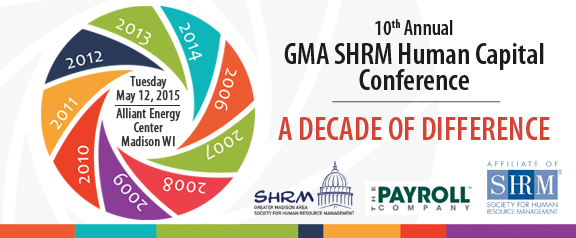
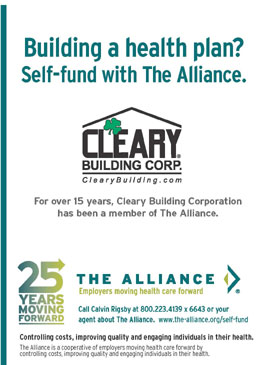
 1. Give them a shout-out. Here is a really cool but simple way to get someone’s attention when either sharing or commenting on a status update.
1. Give them a shout-out. Here is a really cool but simple way to get someone’s attention when either sharing or commenting on a status update.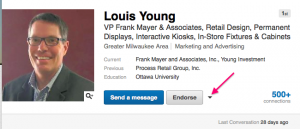 2. How many connections is 500+? You can now get reasonably close to the actual number by going to the person’s profile, scrolling over the small down arrow, and then clicking View recent activity. The number of followers will appear in the upper right-hand corner. Followers are defined as connections plus people who have clicked the Follow button on someone’s profile. Thus, the number isn’t exact, but it should be pretty close to the number of connections the person has.
2. How many connections is 500+? You can now get reasonably close to the actual number by going to the person’s profile, scrolling over the small down arrow, and then clicking View recent activity. The number of followers will appear in the upper right-hand corner. Followers are defined as connections plus people who have clicked the Follow button on someone’s profile. Thus, the number isn’t exact, but it should be pretty close to the number of connections the person has. 5. I’m not really interested in what you have to say. If someone is sharing updates that are really not in your areas of interest but you don’t want to disconnect with the person, just scroll over to the top right-hand corner the next time you see one of his/her updates and click the word Hide. Then you will no longer receive the person’s updates in your feed. You can always “unhide” if you want to start receiving them again.
5. I’m not really interested in what you have to say. If someone is sharing updates that are really not in your areas of interest but you don’t want to disconnect with the person, just scroll over to the top right-hand corner the next time you see one of his/her updates and click the word Hide. Then you will no longer receive the person’s updates in your feed. You can always “unhide” if you want to start receiving them again.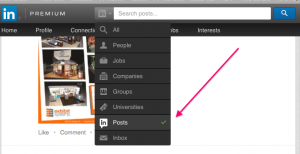 6. Find the experts and see what they are writing about. You can search the entire LinkedIn database of long-form published posts (articles), even those written by people you are not connected to. Just use keywords after you select Posts from the drop-down menu in the main Search box.
6. Find the experts and see what they are writing about. You can search the entire LinkedIn database of long-form published posts (articles), even those written by people you are not connected to. Just use keywords after you select Posts from the drop-down menu in the main Search box.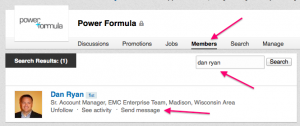 10. Who doesn’t love to save $10? Here is one that may save you lots of money. In order to send a direct message to a person you are not connected to, you have to purchase an InMail or use one of the InMails you get with your premium account–unless, of course, you share a LinkedIn group with that individual. Yes, that’s right. If you are both in the same group, you can message him/her for free–with only one exception; that is, if the person has changed his/her settings and chosen to not accept messages from fellow group members. However, this rarely happens because the default setting is Allow members of this group to send me messages via LinkedIn.
10. Who doesn’t love to save $10? Here is one that may save you lots of money. In order to send a direct message to a person you are not connected to, you have to purchase an InMail or use one of the InMails you get with your premium account–unless, of course, you share a LinkedIn group with that individual. Yes, that’s right. If you are both in the same group, you can message him/her for free–with only one exception; that is, if the person has changed his/her settings and chosen to not accept messages from fellow group members. However, this rarely happens because the default setting is Allow members of this group to send me messages via LinkedIn.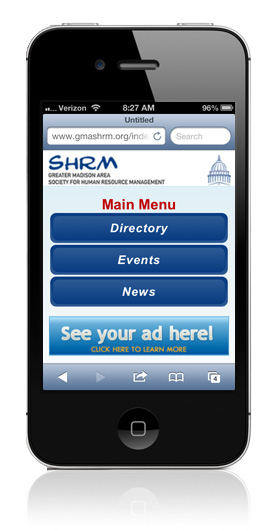 Our Member Directory is Now Mobile Friendly!
Our Member Directory is Now Mobile Friendly! 